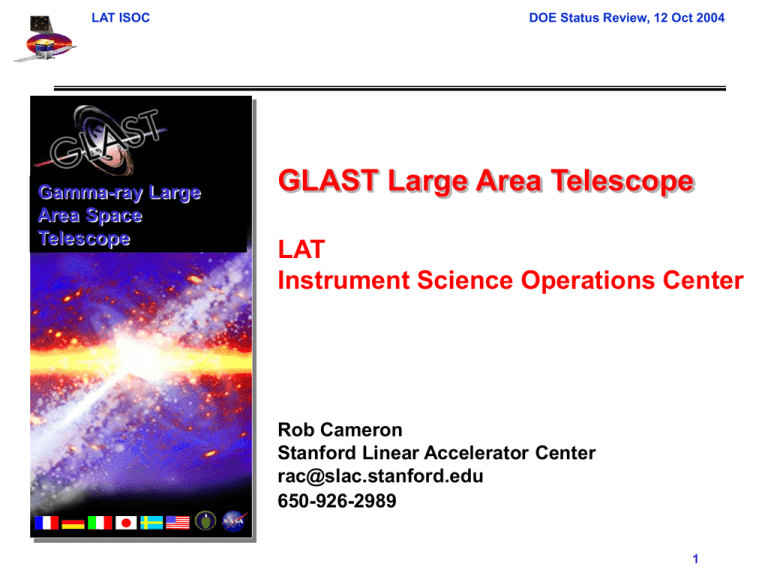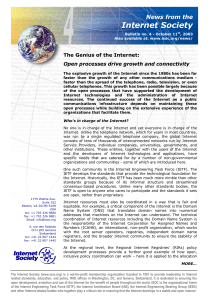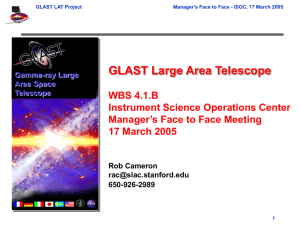GLAST Large Area Telescope LAT Instrument Science Operations Center Rob Cameron
advertisement

LAT ISOC Gamma-ray Large Area Space Telescope DOE Status Review, 12 Oct 2004 GLAST Large Area Telescope LAT Instrument Science Operations Center Rob Cameron Stanford Linear Accelerator Center rac@slac.stanford.edu 650-926-2989 1 LAT ISOC DOE Status Review, 12 Oct 2004 Outline Overview ISOC Organization ISOC Operations Software Architecture Operations Facility Planning Development Schedule Current Status 2 LAT ISOC DOE Status Review, 12 Oct 2004 LAT ISOC in the GLAST GDS Analysis Software 3 LAT ISOC DOE Status Review, 12 Oct 2004 LAT ISOC Objectives The LAT ISOC is organized to: – safely operate the instrument – produce the LAT science data products Functions: – Command generation; health and safety monitoring – Maintain and modify flight software and testbed – LAT performance verification and optimization – Process and archive Level 1 and Level 2 data – Maintain and optimize the software pipeline that produces science data products These functions are organized as teams that share personnel 4 LAT ISOC DOE Status Review, 12 Oct 2004 ISOC Reviews ISOC Peer Review: 2 March 2004 ISOC CDR: 4 August 2004 GLAST GSDR: 18-19 August 2004 CDR: very successful review – 8 RFAs and 8 Recommendations received – 6 RFA responses submitted for review, others in work – All recommendations completed GSDR: very successful review – No ISOC-specific RFAs – Ground-system RFAs will be applied to ISOC as needed 5 LAT ISOC DOE Status Review, 12 Oct 2004 CDR RFA Status Section RFA Title Requestor Actionee ECD/Comments Sent to Originator for Review 1 ISOC Documentation Tree E. Andrews L. Bator Response submitted 8/12/04 2 Requirements Traceability Tool E. Andrews B. Craig J. Martin Response submitted 8/27/04 3.1 Add ISOC Architecture Diagram E. Andrews B. Craig Response submitted 8/16/04 3.4 ISOC Requirements & Testing (Overall) E. Andrews J. Martin Response submitted 9/14/04 4.2 SAA Handling Approach N. Johnson L. Bator Response submitted 8/30/04 4.2 Launch Critical Support Plan M. Rackley J. Leibee S. Culp Awaiting GSFC input 4.2 Red/Yellow Limit Philosophy J. Leibee L. Bator Awaiting SAI definitions 8 SAS Verification Approach M. Rackley J. Martin Response submitted Submitted to Chairpersons Closed 9/07/04 9/14/04 6 LAT ISOC DOE Status Review, 12 Oct 2004 ISOC Organization ISOC Manager R Cameron Database Commanding, Health & Safety Flight Software Documentation Performance V&O Science Products Science Analysis Tools Timeline Planning Code Maintenance Calibration Level1 CRs, gammas, diagnostics Simulation/Recon Command Generation Code V&V Performance Trending Level 2 Transients, GRBs Science Tools Command V&V Testbed Maintenance Standard Source Monitoring Pipeline Operation Infrastructure Health & Safety IRF Generation Configuration Tracking 7 LAT ISOC DOE Status Review, 12 Oct 2004 Commanding, Health and Safety The Commanding, Health and Safety (CHS) team is responsible for: – LAT mission planning support – generation and validation of LAT commands – passing LAT commands to the GSSC – verifying commands were correctly executed – receiving Level 0 data from the MOC – logging and archiving of all commands and Level 0 data – monitoring data to ascertain and track the health and safety of the instrument – continuous knowledge of the configuration of the LAT 8 LAT ISOC DOE Status Review, 12 Oct 2004 CHS System ITOS used for command, health and safety functions – HK data limit checking – Telemetry and command definition file validation – Command load verification and validation ITOS provides compatibility with MOC Other tools – Level 0 receipt and archiving – HK trending – Data transmission – Mission planning and generation of file uploads – Anomaly tracking and notification – Relational database queries for trending and analysis – Configuration management tools 9 LAT ISOC DOE Status Review, 12 Oct 2004 Flight Software The Flight Software (FSW) team is responsible for: – Updating and validation of all flight software files – Debug or problem fixes to the FSW – Implementation, and validation on the instrument test bed of authorized upgrades to FSW – Continuing maintenance of the instrument testbed to ensure it is available to validate code and command sequences as well as to investigate any anomalies seen on orbit FSW team moves into ISOC after FSQ (April 2005) – Continue code/test/CM cycle as part of the ISOC operations – Maintenance of Test Bed – Review commanding, HK, and performance on a frequent and regular basis 10 LAT ISOC DOE Status Review, 12 Oct 2004 Performance Verification and Optimization The Performance Validation and Optimization (PVO) team is responsible for: – instrument calibration from low level through to IRFs – continuous monitoring of the LAT science performance, identification of instrument performance trends and resolution of performance anomalies – generation of performance reports – generation and initial validation of algorithms that improve on-orbit performance of the LAT – management of pre-launch test and calibration data – configuration and maintenance of the LAT reference geometry and the LAT Monte Carlo Model The basic structure for the PVO team is already in place for LAT I&T activities 11 LAT ISOC DOE Status Review, 12 Oct 2004 Science Products The Science Products Team is responsible for – Generation, archiving and distribution of the Level 1 data – Generation, archiving and distribution of specific Level 2 data needed for transient source detection and GRB parameter determination – Configuration control of the pipeline and generated data The functions (pipeline etc) used by the Science Products team are developed by the Science Analysis Software team 12 LAT ISOC DOE Status Review, 12 Oct 2004 Science Analysis Software The Science Analysis Software Team is responsible for – Development and maintenance of the pipeline machinery – Development and maintenance of the simulation, reconstruction and event classification software – Development and maintenance of the calibration algorithms, including low level cal and Instrument Response Function generation – Development and maintenance of the quicklook transient analysis tools – Development and maintenance of the high-level diagnostics derived from reconstruction and classification – Development and maintenance of the high-level analysis tools ISOC will have responsibility for tools used to produce its deliverables 13 LAT ISOC DOE Status Review, 12 Oct 2004 ISOC Staffing Plan ISOC staff will grow mostly by team transfer, plus some new hires ISOC Staffing by Job Function FTE 60 50 Support 40 Scientist Technician 30 Software 20 Engineering 10 Management 0 1 5 9 13 17 21 25 29 33 37 41 45 49 53 Months since March 04 14 LAT ISOC DOE Status Review, 12 Oct 2004 ISOC Operations ISOC will be involved in all phases of LAT operation: LAT I&T – Pre-FSW (EM) – Post-FSW (Flight unit level) – TVAC test at NRL Observatory I&T at Spectrum Astro Launch and Early Orbit (L&EO) – Phase 0 – LAT power-on and configuration – Initial checkout and calibration First year – Phase 1 – Survey mode Second and subsequent years – Phase 2 – Pointed observations – Survey mode 15 LAT ISOC DOE Status Review, 12 Oct 2004 Initial Turn-On and Checkout (Phase 0) Launch and Early Orbit (L&EO) phase currently scheduled for 60 days Instrument turn-on will not be executed automatically – Humans required to check environmental conditions prior to significant steps – Must establish correct LAT configuration at each step Functional checkout of DAQ, ACD, CAL and TKR Initial calibrations ISOC will have staff at MOC during L&EO, but data will also flow to west coast ISOC for processing 16 LAT ISOC DOE Status Review, 12 Oct 2004 Science Operations (Phases 1 and 2) Data taking – Continuous – Few commands needed Calibration – Weekly, biweekly and monthly – A few commands to initiate Load changes to tables and FSW – Infrequent – A few commands and/or file uploads which may be large Load new tables and files – Infrequent – A few commands and/or file uploads which may be large Perform Diagnostics – Infrequent – A few commands and/or file uploads which may be large 17 LAT ISOC DOE Status Review, 12 Oct 2004 Operations Coverage Weekday, day-time operations – Mission planning, command building – Operator shift coverage • 5 am to 2 pm to cover MOC shift times on East Coast • 9 am to 6 pm to cover ISOC internal coordination needs Telemetry monitoring and science data processing – Continuous automatic processing On-call support available 24/7 – Support for targets of opportunity, anomalies – Operators for real-time commanding or anomaly support – Software engineer for emergency software support – Computer technician for computer/network support – Team Lead and Instrument Physicist for anomalies 18 LAT ISOC DOE Status Review, 12 Oct 2004 LAT Mission Planning Timeline Weekly mission planning cycle, with 3 week lead time Monday Tuesday July 30 Wednesday 31 Thursday Friday August 1 2 GSSC Sends Preliminary Activity Timeline to MOC 6 7 8 Sunday 4 5 11 12 18 19 MOC Requests TDRSS Contacts for the Week 9 10 ISOC Sends Command Plan to GSSC ISOC Generates Command Plan 13 Saturday 3 14 15 16 17 Deadline for ISOC to Send Changes* to Week 20 21 GSSC Sends Final Activity Timeline to MOC 27 22 MOC Uploads ATS 28 23 24 25 26 31 September 1 2 ATS Goes Active 29 30 *Minor changes that don’t affect observing schedule or TDRS contacts 19 LAT ISOC DOE Status Review, 12 Oct 2004 Software Architecture: Primary Data Flows LAT ISOC MOC Level 0 Data, LAT Alerts, Integrated Observ. Timeline, Spacecraft Timeline, As-Flown Timeline, Flight Dynamics Products, SC Incident Reports, PDB updates Level 0 Sci Data Receive & Archive Level 0 Hkpg Data, LAT Alerts Integrated Observ. Timeline, Spacecraft Timeline, As-Flown Timeline, Flight Dynamics Products GSSC Anomaly Tracking & Notification System GSSC Contingency: LAT Instrument Commands, LAT Instrument Loads, LAT Timeline Archive & Send Tested OK Commands to Verify Alerts, Logs, Process status, File status Archive & Send Level 1&2 Sci Data Products, LAT Timeline CHS monitoring & trending Mission Planning Receive & Archive Prelim. Science Timeline, Long Term Science Schedule, Observ. Timeline Package Science Data Analysis Pipeline Level 1&2 Sci Data Products LAT Test Bed MOC LAT Incident Reports, LAT T&C Database Updates All data into ISOC, and products out Database Web Access 20 LAT ISOC DOE Status Review, 12 Oct 2004 Automatic Telemetry Processing LAT ISOC Science Data Analysis Pipeline Calib. DB Calibration Trending Level 0 sci & hkpg telemetry, LAT Alerts MOC GINO & FastCopy/DTS GINO & FastCopy/DTS Level 1 processing Receive & Archive Level 0 science telemetry Apply Calibration Reconstruction Archive & Send System-level Monitor Level 2 processing Subsystemlevel monitor GCN Level 1&2 data products GSSC Transient Search/ GRB Refinement Level 0 hkpg telemetry, LAT Alerts Realtime Level 0 hkpg telemetry (during contacts), LAT Alerts ITOS Monitor hkpg parameters Text & Stripchart displays (optional) Monitor Trends ITOS Monitor Data Alerts, Logs, Process status, File status FASAT Anomaly Tracking & Notification System Reports, Log entries, Data Products received and sent Database STOL Config monitor scripts Beeper / email message Beeper / email message 21 LAT ISOC DOE Status Review, 12 Oct 2004 Requirements Drive ISOC Design ISOC requirements tracing is complete Each ISOC Level 3 requirement was identified as: 1. Procedural (non-software) 2. Existing software 3. Under development by SAS 4. To be developed by others (I&T, FSW, ITOS) 5. New development needed 42 277 39 21 88 Total 467 Some requirements map to multiple categories or SW tools, so total exceeds total number of Level 3 requirements (379) Top-down planning and scheduling of new software development is underway 22 LAT ISOC DOE Status Review, 12 Oct 2004 ISOC Operations Facility Working with SLAC management and Facilities group to define near-term ISOC operations facility. Coordinating ISOC space requirements with LAT project management. Near-term ISOC facility: a new temporary building at SLAC Long-term ISOC facility: discussions are starting with SLAC and KIPAC management on ISOC facility in new Kavli building at SLAC, available 2006. Also ISOC presence on Stanford campus. 23 LAT ISOC DOE Status Review, 12 Oct 2004 Proposed ISOC Layout for 60΄x36΄ Building 59'-6" 15'-0" 25'-0" 15'-0" 11'-0" Operations Center 35'-6" Viewing wiindow Glass doors or glass windows in doors 20'-0" Cipher locked Glass window in door 14'-6" Glass window in door No window (wall for projection screen) 24 LAT ISOC DOE Status Review, 12 Oct 2004 ISOC Trailer Location 25 LAT ISOC DOE Status Review, 12 Oct 2004 ISOC Development Schedule Phase / Milestone A u g 0 4 S e p 0 4 O c t 0 4 N o v 0 4 D e c 0 4 J a n 0 5 F e b 0 5 M a r 0 5 A p r 0 5 M a y 0 5 J u n 0 5 J u l 0 5 A u g 0 5 S e p 0 5 O c t 0 5 N o v 0 5 D e c 0 5 J a n 0 6 F e b 0 6 M a r 0 6 A p r 0 6 M a y 0 6 J u n 0 6 J u l 0 6 A u g 0 6 S e p 0 6 O c t 0 6 N o v 0 6 D e c 0 6 J a n 0 7 F e b 0 7 ISOC CDR GSDR ITOS setup/configuration ISOC Verif. with Test Bed DB/Web/E-logbook Dev Plotting/Trending Dev Mission Planning Dev Diagnostic Tool Dev ISOC Demos ISOC Simulation Testing ISOC SW Releases 1 2 4 3 Ground Readiness Tests 2 3 4 5 7 6 End-to-End Tests 1 2 3 4 5 6 Environmental tests at NRL ISOC testing at NRL ISOC ready to take over LAT operation ISOC used to I/F with LAT (front-door only) Mission Simulations Launch SW Dev Slack Times 26 M a r 0 7 LAT ISOC DOE Status Review, 12 Oct 2004 Current Status ISOC team structure and development plan is in place – System development underway – Software releases, GRTs and ETE tests as milestones ISOC activity is ramping up – ISOC staffing plan is being refined – Recent hires in July, August – CHS software developer starting in November – Test engineer to be hired in 2004 – ISOC facility and infrastructure being developed Lots of coordination effort needed between various project elements to bring together all the elements of the ISOC – e.g. inter-team meetings, ICDs 27


